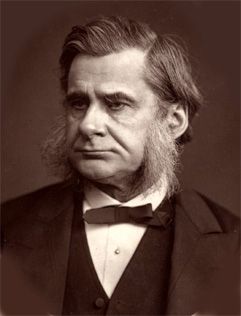
Under the microscope today is the following passage, which is widely attributed in creationist circles to Darwin’s bulldog, Thomas Henry Huxley: “It is clear that the doctrine of evolution is directly antagonistic to that of creation…Evolution, if consistently accepted, makes it impossible to believe the Bible.” In part 1, I identified the source of the first half of the passage: the article on evolution in the ninth edition of the Encyclopedia Britannica, which contains the sentence “It is clear that the doctrine of evolution is directly antagonistic to that of creation.” The problem is that the encyclopedia’s article on evolution is divided into two parts, and while the first part, on “Evolution in Biology,” is signed with the initials THH, the second part, on “Evolution in Philosophy,” is the part that contains the sentence in question. And it is signed with the initials JS, which stand for James Sully (1842–1923), then (i.e., before 1878, when the article was first published) early in his career as philosopher and psychologist.
Reading the whole of Sully’s contribution, it is clear that it would be unfair to represent him as portraying evolutionary science as opposed to the Bible. He distinguishes evolution in general from “the modern doctrine of evolution in its narrow sense…[as] essentially a product of scientific research and speculation,” and says of the latter that “[t]he bearing of the doctrine of evolution on religious ideas is not so easy to define…the idea is by no means incompatible with the notice of an original Creator, though it serves undoubtedly to remove the action of such a being further from our ken.” With regard to the question of a future afterlife, he suggests that although evolution might seem to undermine it, “it may be found, after all, that it leaves the question very much where it was.” These are not the words of someone insisting that evolutionary science is definitively and unequivocally incompatible with Christianity. But even if they were, they still wouldn’t be the words of Thomas Henry Huxley!
What about the second half of the passage—“Evolution, if consistently accepted, makes it impossible to believe the Bible”? It isn’t in fact unrepresentative of Huxley’s thinking about the relationship between evolution and Biblical literalism. For example, in 1892, he was engaged in a dispute over Genesis and evolution in the letters column of the Times of London. Comparing “the natural sense of the text” of the first chapter of Genesis with the deliverances of natural science, he concluded, “Until it is shown that the first two propositions are not contained in the first chapter of Genesis, and that the second pair are not justified by the present condition of our knowledge, I must continue to maintain that natural science and the ‘Mosaic’ account of the origin of animals and plants are in irreconcilable antagonism.” (It is noteworthy, though, that Huxley wasn’t hostile to the Bible in general, recommending that it be taught in Britain’s public schools on its moral and literary merits.) But were those his exact words?
The earliest appearance of the “impossible to believe the Bible” sentence I have been able to find is in a 1905 book by Joseph Birkbeck Burroughs (1854–1921) entitled Titan, Son of Saturn: The Coming World Emperor. (I’ll just wait here in parentheses while you gasp in awe at the splendor of that title, okay?) The Left Behind of its time, Titan, Son of Saturn was a widely read novel—it reached its tenth edition in 1917—that sought to dramatize the Biblical prophecies of the End Times as Burroughs understood them. “[L]ater editions marshaled a series of commendations from prominent pastors whose names, by 1914, included that of the respected evangelical James M. Gray, an Episcopal clergyman who had become a leading figure in the Moody Bible Institute, a contributor to The Fundamentals[,] and editor of the Scofield Reference Bible,” notes Crawford Gribben in Writing the Rapture (2009). So the book was doubtless read by, or at least known to, the leaders of the antievolutionist campaigns in the 1920s.
In chapter 3 of the novel, the young Homer McRain is riding with Dr. Southern Twofold (!) in his carriage, listening to him deliver a lengthy antievolutionary rant. (Burroughs was a doctor, so it’s especially tempting to regard Dr. Twofold as the author’s voice here.) Dr. Twofold eventually declaims:
There is offered to every young student a life of faith in God or a life of reasoning with the rationalists. It’s Genesis or evolution; Jesus or Darwin. You can not [sic] hold to both. The evidence is in not a few parsonages that Huxley was right when he said, “The doctrine of evolution is directly antagonistic to that of creation. Evolution, if consistently accepted, makes it impossible to believe in the Bible.” That this is true has been seen in many young men…
Since he was in his carriage, presumably without his library at hand, it’s hard to fault Dr. Twofold, and Burroughs himself may be granted the privilege of literary license. But if I’m right about the source of the sentence, those relying on Titan, Son of Saturn for their information about Huxley should have remembered that it was fiction.

